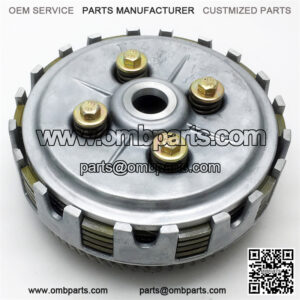There is nothing more annoying than setting off on your planned lovely motorcycle trip, maybe heading somewhere new to explore, and here it comes – the clutch starts making strange noises, or even stops working completely!
It’s surely bothersome, but don’t give up on your bike just yet! When was the last time you checked your clutch oil? The oil used to lubricate a motorcycle wet clutch plays a huge role in clutch feel and effectiveness.
MOTORCYCLE WET-CLUTCH 101
First, a few basics.
As shown in the graphic, the clutch connects the engine and transmission via a series of alternating friction and steel plates. Wet clutches are widely used in motorcycles and dirt bikes. The term simply means the clutch is lubricated with oil, as opposed to a dry clutch. Friction plays a big role in proper clutch operation.
To illustrate, imagine sitting aboard a motorcycle or dirt bike with the clutch lever activated, idling at a red light or at a starting gate. The friction and steel plates are separated, allowing the bike to run without moving. The light turns green or the gate drops. As you let out the clutch lever, the plates squeeze together. The transition from the friction and steel plates spinning independently to becoming locked together is an example of dynamic friction. Once the plates are locked together and spinning in unison, they’re subject to the principles of static friction.
Oil chemistry is important
Engine oil plays a vital role in both areas. The formulation influences the dynamic friction you experience, which is best thought of as “clutch feel”. Oils with incorrect frictional properties can result in inconsistent or “loose” clutch feel.
This negatively affects your ability to confidently pull away from a red light without the bike cutting out, or start quickly and grab the holeshot in a race. The oil also contributes to the holding power, or static friction, between the plates once the clutch lever has been let all the way out and you’re riding. Oils with incorrect frictional properties can allow the plates to slip in some circumstances, which you’ll feel as lost power to the ground. A powerful V-twin riding up a hill, for example, can generate sufficient load to cause the clutch plates to slip and the bike to surge.
The key is to use a lubricant specifically formulated for wet clutches. AMSOIL Synthetic V-Twin Motorcycle Oil, Synthetic Metric Motorcycle Oil, Synthetic Dirt Bike Oil and Synthetic Dirt Bike Transmission Fluid contain no friction modifiers or extreme-pressure additives. They’re made with the correct frictional properties to promote smooth shifts and consistent clutch feel while guarding against wear for long clutch life.
Using a good oil – and riding carefully – helps you keep your bike on track for your next roadtrip!

